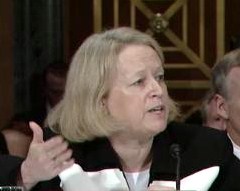By Pam Martens: December 10, 2012
This past Friday, the Securities and Exchange Commission (SEC) brought an enforcement action against an alleged Miami fraudster, Claudio Osorio, and his accountant, Craig Toll, whom it charged with swindling $16.8 million from five duped investors based on a series of outrageous lies about their startup company. Now, thanks to Congress and its second worst financial idea since the repeal of the Glass-Steagall Act in 1999, things just got a lot easier for stock charlatans.
In April, President Obama signed into law the Jumpstart Our Business Startups Act (JOBS Act). The title of the legislation tells you all you really need to know: this Congress will pass the most horrific piece of anti-consumer, anti-investor legislation if it has a flag-waving title and enough special interest money backing it.
The goal of the legislation is in keeping with the grotesque mindset of Washington: in the midst of the lingering effects of the worst economic crisis since the Great Depression — caused by the deregulation of Wall Street; the answer is to deregulate Wall Street further.
Under the new legislation, men like Osorio would be able to engage in private placements of stock offerings via general solicitations to the public, such as telemarketing, and through advertising via media and the internet. In other words, instead of defrauding just five investors, as the SEC charged in the Osorio case, because legislation barred him from being able to advertise broadly to potential investors, stock charlatans will now be able to jumpstart their frauds and reach thousands of investors.
Barbara Roper, Director of Investor Protection at the Consumer Federation of America, provided the backdrop to this insanity in an October public comment letter to the SEC:
“Long experience has taught us that, if a market becomes tarnished by fraud, legitimate companies will find it more difficult and costly to raise capital. The Commission’s experience in the 1990s with regard to Rule 504 offerings is instructive in this regard. Rule 504 offers an exemption for unregistered companies seeking to raise a small amount of seed capital. In 1992, as part of an effort to promote small company capital formation, the Commission amended the rule to ‘eliminate all restrictions on the manner of offering and on resales under Rule 504,’ thus permitting general solicitation and advertising for all Rule 504 offerings. Within a few years of amending the rules, however, the Commission had noticed a significant increase in fraud associated with ‘microcap’ companies relying on the Rule 504 exemption. Having found that the elimination of the general solicitation and advertising ban had contributed to the increase in fraud, the Commission restored the ban.”
Congress was made aware during hearing testimony that the legislation it was about to pass had been tried before and produced “a significant increase in fraud” and yet it passed the legislation anyway. Hedge funds, private equity firms and big law firms wanted the legislation and they got it.
On April 5, the day President Obama signed the legislation, William (Bill) Black, associate professor of economics and law at the University of Missouri–Kansas City, gave an interview on the legislation to The Real News.com. Black had this to say:
“The equity markets, the stock markets of the United States, were really, really successful markets, and U.S. stocks, which are also called equities, traded at a premium compared to stocks of companies issued in other nations. And the reason they traded at a premium is that only the United States had an effective securities regulator, the Securities and Exchange Commission, the SEC, and that reduced the risk of fraud, and therefore people were willing to pay more for the shares. And if they’re willing to pay more, then you raise more capital. And if you raise more capital, potentially you are more productive and get more jobs and all those good things. So we had something that worked really well, and then we decided that we should ruin it. And we did that first by weakening the SEC for decades, such that the SEC, by the time of Enron, instead of looking at about 100 percent of securities filings looked at 5 percent of securities filings. And, of course, fraud flourished…
“So this is not a way of helping honest people issue shares. This helps the frauds, the pump-and-dump schemers. And in particular it has nothing to do with the Apples of the world and such, because that land of high tech has unusually great financing available to it, particularly in the United States, from venture capital firms. And those venture capitalists of course want to know: do you really have assets, do you really have a business plan? So they do want accounting rules. So high tech is not the area that is of interest in this new law at all.”
When the SEC put its proposed rule on the general solicitation and advertising facet of the legislation out for public comment, it received criticism on its vague plans to protect investors. Interestingly, there was one giant Wall Street law firm that thought the SEC’s rule proposal was just swell.
In an oddly unsigned letter, the 130-year old, 800-lawyer strong Sullivan & Cromwell LLP told the SEC that “we think the proposed rule changes represent a thoughtful implementation of the JOBS Act requirements….” The law firm represents hedge funds, private equity firms and Wall Street financial institutions along with other corporate interests.


